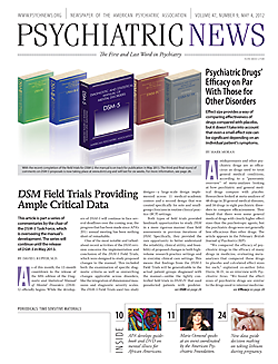An innovative study of 200 adults who survived an earthquake in Armenia found a significant association between two genes and the risk for posttraumatic stress disorder (PTSD).
Two variations of tryptophan hydroxylase genes, called TPH1 and TPH2, which control the production of serotonin, were associated with PTSD symptoms, said lead author Armen Goenjian, M.D., online April 5 in the Journal of Affective Disorders. Goenjian is a research professor of psychiatry at the David Geffen School of Medicine at the University of California, Los Angeles.
“To our knowledge, this is the first report that has shown the association of TPH genes with PTSD symptoms,” Goenjian told Psychiatric News.
The findings, he said in the report, “suggest that the serotonergic system may be causally implicated in the onset and/or persistence of PTSD.”
The study’s design provides several advantages, said Karestan Koenen, Ph.D., an associate professor of epidemiology in the Mailman School of Public Health at Columbia University, who was not involved with Goenjian’s research.
“The novel contributions of this study are the family-based design and the recruitment of people exposed to the same trauma,” said Koenen.
That single traumatic event was the 1988 Spitak earthquake. Data were gathered about 14 years after the earthquake.
“In the case-controlled studies that are typical of this kind of research, the participants are exposed to different traumatic events with varying severity,” said Koenen in an interview. “They also bring differences in genetic background to the study.”
However, Goenjian’s subjects not only experienced the same event but were drawn from just 12 families, reducing the differences in genetic background and allowing for stronger conclusions, said Koenen.
The families in the study were unascertained, permitting independent evaluation of the heritability of PTSD and depression, said Goenjian. “Only two of these subjects were seeking treatment.”
Goenjian and colleagues reported that the TPH1 ‘t’ allele is significantly associated with PTSD symptoms (p<0.004) and explains about 3 percent of the phenotypic variation. The same allele showed a nonsignificant trend (p=0.08) for an association with depression. The ‘t’ allele of TPH2 was also significantly associated with PTSD, and explained 4 percent of the variance.
In addition, the ‘s’ allele of the 5HTTLPR serotonin transporter polymorphism was significantly associated with depression (p=0.03) and explained 4 percent of its variance.
The two TPH alleles may affect vulnerability to PTSD symptoms by reducing the transcriptional activity of the TPH enzymes and thus decreasing production of intracellular serotonin, Goenjian suggested.
The small variance of each allele hints that other genes likely influence symptoms.
The study also highlights an ongoing change in approaches to identifying genes associated with disease, said Koenen.
With candidate gene studies like this one, researchers make an educated guess about which genes might be important and see how their presence or absence fits with patterns of illness.
“But our knowledge of pathophysiology is limited,” she said. “You could nominate hundreds or thousands of genes, and so the choice can be a bit arbitrary. Results have been inconsistent so far.”
More recently, investigators have been using genomewide association studies that compare complete genomes “agnostically,” in Koenen’s word, looking for patterns. More such studies can be expected in the future.
Meantime, additional research will be needed to confirm the role of these genes in PTSD, said Goenjian.
“Future studies should expand the research to different ethnic and racial populations as well as evaluating individuals exposed to different types of traumas and looking at other genetic regions to locate genes that cause this trait,” he said.

